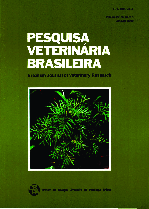 |
|
|
|
Year 2002 - Volume 22, Number 1
|

|
Serotyping of Streptococcus suis strains isolated from pigs in the States of São Paulo, Minas Gerais e Paraná, Brazil, 22(1):1-5
|
ABSTRACT.- Pagnani K.J.R., Pestana de Castro A.F., Gottschalk M., Silveira, W.D. & Nakazato G. 2002. [Serotyping of Streptococcus suis strains isolated from pigs in the States of São Paulo, Minas Gerais e Paraná, Brazil.] Sorotipagem de amostras de Streptococcus suis isolados de suínos em granjas dos Estados de São Paulo, Minas Gerais e Paraná. Pesquisa Veterinária Brasileira 22(1):1-5. Depto Microbiologia e Imunologia, Instituto de Biologia, Universidade Estadual de Campinas (Unicamp), Campinas, SP 13081-970, Brazil.
Streptococcus suis infection in swine is common in all countries where hog production is well developed. This infection has been associated with bronchopneumonia, meningitis, arthritis, pericarditis, myocarditis, endocarditis, fibrinous polyserositis, septicaemia, rhinitis, and abortion. Streptococcus suis has also been described as a pathogen for ruminants and humans. In Brazil there are severa! clinical evidences about the existence of S. suis disease in pigs affecting more than 50% of farms in States of São Paulo, Minas Gerais and Paraná. In the present research 51 strains of S. suis isolated from piggeries of the States of São Paulo, Minas Gerais and Paraná were collected from different pathologies such as septicaemia, meningitis, arthritis and pneumonia and been recovered either in pure culture oras the predominant organism from porcine tissues. Culture of specimens was carried out on 5% bovine blood agar plates incubated at 37ºC for 24 hr: For the biochemical identification the a-hemolytic colonies of all capsulated isolates were submitted to various conventional tests, such as hydrolysis of arginine, Voges-Proskauer Test, and production of acid from various carbohydrates (inulin, salicin, trehalose, lactose, sucrose, sorbitol, mannitol and glycerol). The strains were also tested for their ability to grow in the presence of 6,5% NaCI and for the amylase production. In addition strains were tested by Api Strep 20 to confirm the identification of S.suis. For capsular typing only capsulated strains were typed by co-agglutination test, using antisera raised in rabbits against all reference strains from serotypes 1 to 8. Strains belonging to other serotypes were also typed. The co-agglutination was used for serotyping and the capsular reaction test was carried out for mieasuring the potency of the prepared antisera. From the total of 51 examined strains the following results were obtained, with regard to serotyping: 30 (58,8%) were serotype 2, 11 (21,6%) were serotype 3, seven (13, 72%) were serotype 7, two (3,92%) were serotype 1 and one strain belonged to serotype 14 (1,96%). As far as we are concerned, this is the first report on the isolation of a large number of S. suis strains in Brazil, from cases of illness caused by this bacterium among piglets. Also it was carried out serotyping of the isolates, showíng a high prevalence of serotype 2, as compared to other known serotypes of S. suis. |
| |
|
|
| |
|
 |